Gen-Z and the Climate Crisis: Who’s to Blame?
People my age are angry. Increasingly depressed, cynical, and suicidal- but mostly very, very angry. (Unless we’re feeling that compassion fatigue, in which case… well.)
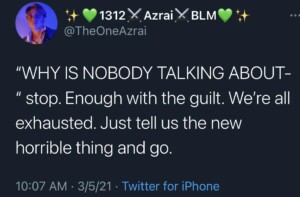
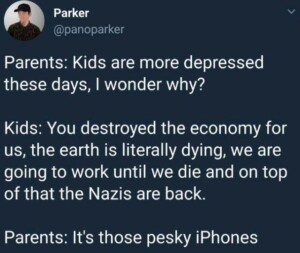
I was born in the year 2000. That year is more or less considered the final cut off point before entering Gen Z territory. Yet I’ve always considered myself stuck within that weird, nebulous zone between generations. This is how I once broke it down to a friend who was born in 1999:
● Millennials: Responsible for “destroying” countless industries. The object of Baby Boomer hate. Parents with actual children. Now questioning their role as the “dominant” gen.
● Gen Z: Edgy teens who are borderline suicidal. Absurdist levels of humor. Typically running at 200% capacity. Usually fierce social justice warriors.
● Us: Just becoming a young adult or have been one for a few years. Already burdened with student loans and the weight of the world on their shoulders. Generally very confused about everything.
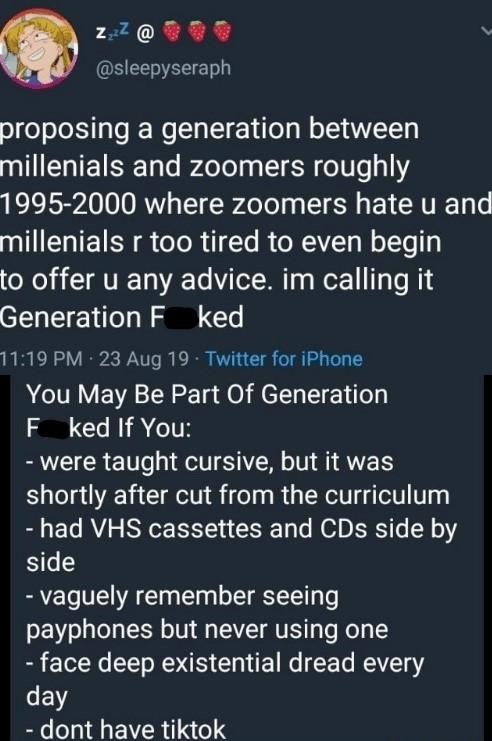
You might know that last category as “Zillenials” or those born from about 1995-2000 (give or take a year or two; the distinction is somewhat arbitrary.) We relate to both 90s and 00s kids in terms of our media, our toys, our culture. We were the last class to be taught cursive in school, and perhaps the last to learn how to read an analog clock. We spent our younger years with CDs, VHS, and VCRs, and then our pre-teen and teenager years spent alongside the rapid development of the smartphone. The latter was, for us, a natural part of growing up.
Being one of these ambiguous “Zillenials,” I feel I am not entirely qualified to speak on behalf of Millenials (or Gen Z) as a whole. Despite having “the best of both worlds” (and there’s an irony if I ever heard one), I do not- cannot- have the whole picture. The attitudes, values, and memories of either generation are not entirely within my grasp.
But being a competent young adult with basic observation and analytical skills, I can make some deductions. Based on discussions over the years with peers my age, on the anti-capitalist sentiments spewed on social media in an ever-growing firestorm (I have a manifesto of examples if you need them), and on the general feelings of climate crisis anxiety that pervade our collective thoughts: it is safe to say we are pissed.
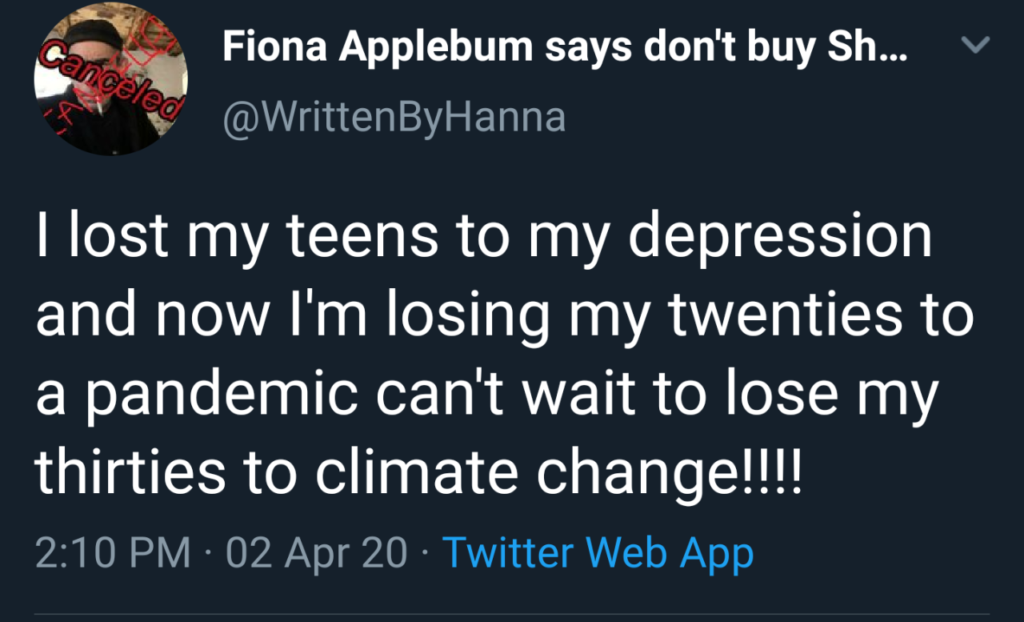
(I mean, with that and the global rise of neo-fascism, can you really blame us?)
Look at the array of catastrophes before us: disappearing coasts, intensified heatwaves, amplified hurricanes and floods destroying the toxic waste industry leaves behind, the mass extinction of pollinators and other species, ocean deoxygenation creating ever growing dead zones, and even predictions like these. I could go on and on. It’s not an exaggeration to say we see no reason to have children: who would want to bring innocent lives into a world poised for multiple armageddons?
At bare minimum- and admittedly, this is a broad generalization- we are potently fatalistic. Don’t believe me? A common dry joke among people under 40 is not needing to worry about retirement funds, since we’ll likely die in the climate and resource wars. (There’s that absurdist humor poking through.) A quote from an Environmental Studies professor in this Fortune Article sums up the situation quite well:
“The young people I am teaching say they will bear the worst consequences of processes they did not initiate, and over which they have little or no control. They speak of an apocalypse on the horizon. My students say they do not expect to enjoy the experiences older adults take for granted—having children, planning a career, retiring. For many youth, climate disruption isn’t a hypothetical future possibility; it is already here.” [Emphasis added.]
That first line is particularly important. We were born into a world that sits on the rapidly crumbling precipice of irreversible ecological collapse, extinction, and mass suffering. And as our window of time to act rapidly draws shut, we asked the older adults to give a damn about our future. Marginal pushes towards sustainability and “greener” energy aside, our leaders simply shrugged and continued onwards with the profitable status quo. (Don’t believe me? Experts say we’ve had an utterly weak answer to the global call for sustainability.)
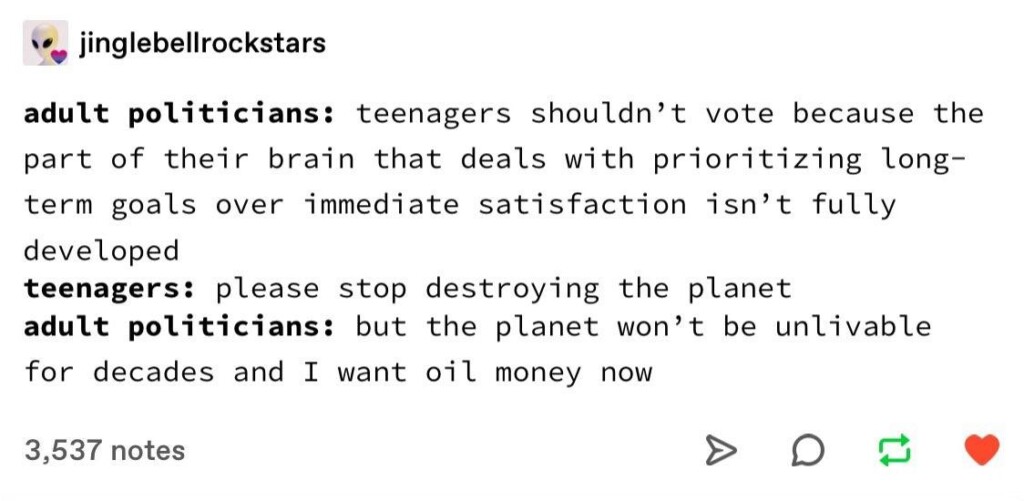
But here’s the thing. As much as we (as much as I personally) want to place the blame on Boomers, it isn’t an entirely fair judgment. For one, climate change is the ongoing result of a cumulative snowball effect of impacts. The shifts we are experiencing seem radical now, but they’ve been building and simmering since the start of the Industrial Revolution. Therefore, pinning all the blame onto a single generation just doesn’t make sense (I think we’re more inclined to do so because Baby Boomers saw the “best” economic conditions that this country will ever have). Further, and this is arguably more important, doing so only plays into the hands of those who benefit from age- and more directly, class- warfare.
Bear with me here as I dip into Marxist theory for a few paragraphs. Class warfare best conceptualizes the disparities in quality of life between the well-off (bourgeois) and the not-so-well off (proletariat). There are some internet squabbles over who is truly “upper class” (politicians versus billionaire CEOs, for example), but it’s generally agreed upon that those within the top 1% of wealth distribution are the elite. Those in the lower class are your everyday workers: minimum-wage positions, of course, but post-undergrad students in all fields now fit this category, too. (Thanks, inflation and rising costs of living!)
Well, what about the middle class, I hear you saying? Sure, some still live in a comfortable suburbia and have a reliable supply of food. But these days, and especially during the era of COVID, the middle class is becoming largely non-existent. Like many other modern-day ills blown out of control- the war on drugs, the attack on women’s reproductive health, the defunding of education, and so much more- we can trace the roots back to Ronald Reagan. A common curse in my generation is against his name: for many reasons, but largely for placing neoliberalism upon the altar as the proverbial Golden Calf. (If you’re interested in our list of grievances with Reagan, here’s a little more about that.)
So, many Millenials and Zoomers are becoming increasingly impoverished, hungry, burned out, physically ill, mentally ill, depraved of creative freedom, and largely dependent on paid services and mindless consumption just to survive. This is by purposeful design, for “what is capitalism, after all, if not a system that rests upon the great majority of the population living in constant fear and insecurity?” Indeed, the mishandling of COVID in America has made it clear that the cruelty is the point.
Theory states the masses are best controlled when they lack the energy and cohesiveness to collectively threaten the thrones of the ruling class. But, as we are seeing today, the discontent will inevitably grow as conditions become more dire. The elites know this, and they know there is little to be done to stop this. After all, maintaining the philosophy of endless exponential growth requires rates of resource exploitation, underpaid labor, and profit earnings to be ramped ever higher. What, then, can be done to secure their place in power as the anger of the discontented aligns?
It’s quite simple, really: use the classic divide and conquer tactic to foster infighting and distract the masses from the real enemy. Now, clearly this is not a revolutionary finding for either my generation or any of the preceding ones. But it is unfortunately all too easy for us to get into the thick of the semantics and to subsequently lose sight of this principle.
The questions my generation should be asking are these: How useful is it to attack an entire demographic when only a small subset of it is responsible for initiating and upholding Reaganism, neoliberalism, and all the other seeds of our current catastrophe? In our eagerness to condemn, have we ever considered that the more progressive, queer, disabled, impoverished and colored Boomers were killed before their time by institutional indifference or outright hostility? Or that, even still, a person’s ultimate character is defined by their behaviors and actions towards others, rather than a trivial demographic attribute such as age?
I believe the thoughts of this Tumblr user refutes our tendency towards generational warfare effectively and concisely:

Though our anger stems from justified trauma and frustration, it’s all too easy to fall into the trap of blaming the wrong people. Unfortunately, “woke” culture is probably to blame here (which, except for the following point, is an entirely different conversation to be had.) It removes the nuance from situations like these by blurring the gray out of the picture entirely. And it shoves complex situations into neat little categorical boxes that invite the viewer to wholeheartedly applaud or condemn their contents. But this is the real world, and situations are rarely that simple or clear-cut.
Now, I’m not saying we shouldn’t condemn those truly responsible for upholding our destructive socioeconomic status quo. Absolutely place criticism where criticism is due, so we can recognize what got us here and what not to do if we want to live in a sustainable and just future. Just engage a little critical thinking, be careful who you point the finger at, and- above all- focus on what we can do here, now, to solve this increasingly urgent crisis.
I can’t blame you if you become paralyzed by climate-related futility. I’ve succumbed to that many times myself, and it is a very real threat. But, on the flip side, it can be a motivating force when utilized correctly. To our credit, many Zoomers are gritting their teeth and stepping up to the plate for their careers. (We’re also getting involved in educational and advocacy campaigns, like this international project for ocean hypoxia.)
All that being said: Does that mean we’ll stop using the infamous “OK, Boomer” throwaway line when someone older makes an asinine observation about our generation or the current state of affairs? Probably not. We’re denied many modern-day forms of fulfillment; the very least you can do is let us derive a morsel of satisfaction from a witty (and mostly harmless) quip.
________________________________________
Additional readings
‘A Planet Full of Ifs’: Young People Express Climate Angst
Gen Z and Millennials Are in a Generational Battle of Who Couldn’t Care Less
Gen Z Is Anxious, Distrustful, and Often Downright Miserable, New Poll Reveals
How Millennials Became the Burnout Generation
Mental Health Issues Increased Significantly in Young Adults Over Last Decade
‘No point in anything else’: Gen Z members flock to climate careers
Noam Chomsky: The Elites Are Fighting a Vicious Class War All the Time
Poor People Often Don’t Survive To Become Seniors Who Vote
The Climate Crisis is Also a Crisis of Capitalism
The Decline In Millennial Health Needs To Be Addressed
The Tipping Point: Most Americans No Longer Are Middle Class
6 Facts About Economic Inequality in the US
Maggie is an Environmental Studies major who recently graduated from SUNY ESF in December. Born and raised in the Finger Lakes region, she is an aspiring writer with a penchant for social justice and environmental stewardship.
